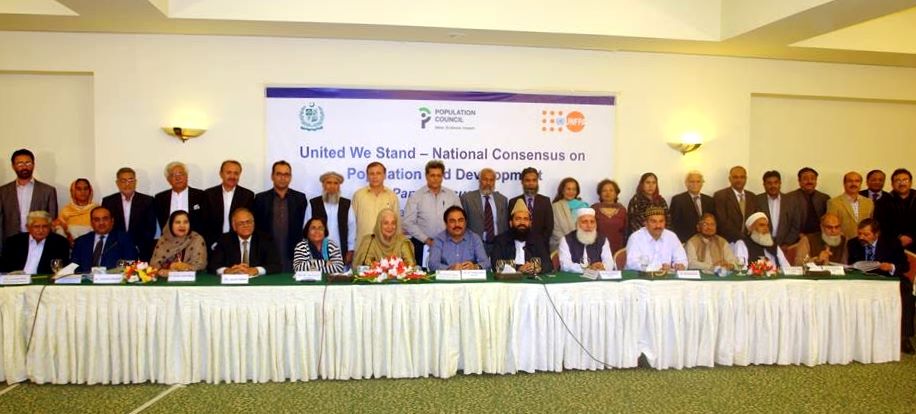Representatives of major political parties and prominent religious leaders of the country endorsed the need for managing the deleterious impact of a rapidly growing population on the health and wellbeing, progress and prosperity of the people of Pakistan.
At a high-level meeting on “United We Stand: National Consensus on Population and Development,” organized by the Population Council, jointly with the Ministry of National Health Services, Regulations and Coordination, and supported by United National Fund for Population (UNFPA), in Bhurban on 15 October 2015, the leaders called upon the government’s policy makers to formulate a new vision and a new narrative for dealing with Pakistan’s population issue.
Begum Zakia Shahnawaz, Provincial Minister for Population Welfare, Govt of Punjab, was the Chief Guest at the occasion. The purpose of the meeting was to demonstrate broad-based political commitment and support of the religious scholars (ulema) for an increased emphasis on slowing down population growth as an issue of national importance. She appreciated the broad-based consensus on the issue which definitely strengthens the position of the government and should encourage it to make all-out efforts to reach out to the people with family planning services.
On behalf of the Ministry of National Health Services, Regulation and Coordination, Secretary, Mr Ayub Shaikh and on behalf of Population Council, Country Director, Dr Zeba Sathar welcomed the religious scholars and the representatives of political parties and federal and provincial governments.
The political parties’ representatives urged the provinces to develop their province-specific policies and plans that are fully implemented so as to improve the standard of living of the people and also propel Pakistan along a steeper development trajectory. They said that although Pakistan had failed to attain the Millennium Development Goals, the newly announced Sustainable Development Goals (SDGs) represent an opportunity that the country cannot afford to miss.
The gathering included senior representatives of the federal and provincial governments and major political parties; senior bureaucrats from all four provinces and special areas; and eminent religious scholars, included: Begum Zakia Shahnawaz Khan – MPA (PML-N); Dr. Azra Fazal Pechuho- MNA (PPP); Dr. Najma Afzal , MPA (PML-N); Ms. Raheela Durrani, MPA (PML-N); Mr. Khawaja Izhar-ul- Hassan, MPA (MQM Dr. Fareed Ahmed Paracha, Deputy Secretary General, Jamaat-e-Islami; Mr. Mehmood Jaan, MPA (PTI); Mr. Rahmat Saleh Baloch, MPA (National Party); and Senator Farhat Ullah Babar (PPP).
Views of Political Leaders
Speaking on the occasion, Dr. Yasmin Rashid from PTI spoke about the loss of precious lives of mothers who died due to complications of repeated and closely spaced pregnancies.
Senator Farhat Ullah Babar from PPP stressed the need for introducing a national narrative on the population issue. He also said that efforts be made for focusing our attention towards improving the social indicators of the country. He said that the SDG agenda was closely linked to population dynamics. He called upon the federal government to work with the provincial governments in outlining the respective targets and goals and supporting the provinces with allocation of adequate resources.
Mr. Izhar Ul Haq from the MQM said that there was a need to introduce specific legislations in the assemblies that would ensure provision of adequate and appropriate reproductive healthcare to all citizens as their basic right.
Ms. Raheela Durrani said that the worsening health indicators of the province of Balochistan were a matter of grave concern. She said that among all the provinces, the unmet need for family planning services was highest in Balochistan as well as maternal mortality. She said improving access to family planning/birth spacing services could radically improve maternal health outcomes.
Haji Adeel from ANP said that their party manifesto clearly outlined the need for reducing the imbalance between growing population and diminishing resources. He said that a balance had to be struck between the two.
Mr. Rahmat Saleh Baloch, Minister of Health, Balochistan, said that the Government of Balochistan has faced with wide-ranging challenges inherited from the past that include poor governance, conflict, and neglect towards social issues. He said that the current government has launched a number of initiatives that will transform the lives of the people and that the health infrastructure is being revamped to improve access to health services in the far-flung areas of the province. Progress and development of the nation can only be ensured if the people are healthy and secure, he maintained.
Dr. Azra Fazal Pechuhu welcomed the idea of developing a broad-based multi-party consensus on the population management issue and urged the provinces and federal government to work together to learn and benefit from each other. Federal government was responsible for ensuring that Pakistan meet its national and international commitments, while the process of prioritization, planning and implementation was the sole responsibility of the provinces, she said.
Mr. Fareed Piracha said that the population issue must be managed in order to improve individual family health and wellbeing. He stressed, however, that family planning must be voluntary, and not imposed upon families.
Mr. Mohammad Jan from PTI and Chairman Standing Committee on Health in the KP assembly said that the KP government had initiated a major health sector reform agenda and ensuring peoples’ wellbeing and their security was central to the government’s development efforts.
Views of Religious Leaders
Moulana Roohullah Madni, Chief Khateeb KPK and Moulana Anwar ul Haq Haqani Provincial Khateeb Balochistan also spoke on the occasion endorsing the concept of birth spacing and declaring it as compatible to the teachings of Islam
Maulana Abdul Kabir Azad, the Grand Imam of the Badshahi Mosque, assured the gathering of the strong cooperation of the ulema in this matter. “Islam deems human life as very precious, and the death, every year, of thousands of mothers and infants in our country due to high-risk fertility behavior was a grave issue that the ulema are resolved to help address” he said adding that Ulema had already issued their statement on the matter at previous gatherings.


